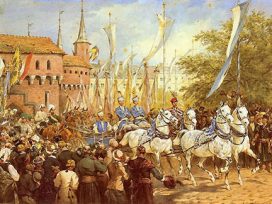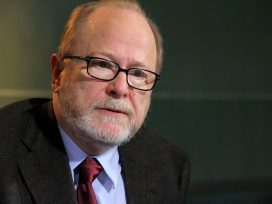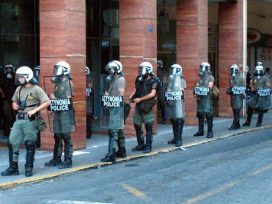Protests at the end of 2012 in Slovenia caught the attention of international newspapers. Boris Vezjak asks what the goal of this “uprising” – suddenly a universally popular concept – is, and whether it might represent more than merely an isolated incident.
Articles
Read more than 6000 articles in 35 languages from over 90 cultural journals and associates.

Flourishing within limits
A conversation with green economist Molly Scott Cato
Green economist Molly Scott Cato acknowledges the extraordinary advances that economic growth has brought. However, she insists that only by learning to flourish within limits can we hope to regain our sense of the good life.
Haunted museums
Ethnography, coloniality and sore points
The troubled relationship between modernity and its colonial past haunts the ethnographic museum. But do new museums of world culture provide a plausible alternative?

The threat that the EU now faces is as deadly as the one that confronted the Habsburg Monarchy a hundred years ago, writes British diplomat Robert Cooper, one of the intellectual architects of EU foreign policy. But getting it right does not need a miracle.

Opening the 24th European Meeting of Cultural Journals, Jan Philipp Reemtsma recited a text by post-war German writer Arno Schmidt, recalling Europe’s “first great cooperative achievement”: the observation of the transit of Venus in 1769.

Against growth
A conversation with economist Joshua Farley
Given the relation between economic production and ecological degradation, Joshua Farley is convinced that economic growth must stop. It is just a question of when. And whether cooperation will displace competition as the dominant concept in the economic paradigm.
Leaked communications are revealing how power works like never before; revelations of political deal-making beyond the public view make assumptions about democratization look like wishful thinking, writes Ciril Oberstar.
Moral progress depends upon hearing voices that say things never heard before, including claims about injustices that may not be perceived as such. On Richard Rorty’s definition of the novel as “characteristic genre of democracy”.
We express our understanding in concepts, but each of our concepts is an extreme simplification consisting of unrelated entities. The fact that we include them in one concept does not clarify our view of the world, but rather obscures it. This also applies to the concept of “art”.

Structural problems in conventional democracies are alienating citizens worldwide, writes Stephen Holmes. Political marketing, cross-party compromise and elite withdrawal threaten to rob democracy of its original role as instrument of justice.
Roma activist Valeriu Nicolae departs for Euro-Narnia, a parallel world ruled over by the mighty Baroslan whose inhabitants discuss in strange and wonderful terms remedies for the Roma problem. But what is the role of the Queen in all of this?
In conversation with the sociologist Gilles Lipovetsky, novelist and Nobel laureate Mario Vargas Llosa discusses the relative merits of “high” and “mass” culture in the contemporary world and defends the ideas explored in his recent book La civilización del espectáculo.
A more exacting and cosmopolitan public debate has emerged in Norway since the terror attacks of 2011, writes the cultural editor of Aftenposten. Yet the renaissance of critical journalism has not translated into greater political transparency.
On 9 November 1918, the first German Republic was declared; exactly four years later, Hitler staged a putsch. The Reichskristallnacht on 9 November in 1938 was linked to both and on 9 November 1989 the division of Germany came to an end. How, then, should Germany commemorate this fateful and ambiguous day?

Controversy around the film “Innocence of Muslims” has prompted a return to a hard line from the Organisation of Islamic Cooperation on the question of blasphemy legislation. Paul Sims reviews the debate in Britain, arguing for criticism of the motives of offenders and avoidance of the trap of censorship.
Ideology or truth? The uses and abuses of critical thinking
A conversation with Norman Lillegard
In a wide-ranging discussion, Almantas Samalavicius and the philosopher Norman Lillegard consider the dangers of relativism, the crisis of education, pleonexia and the economic crisis, and whether literature should provide moral instruction.